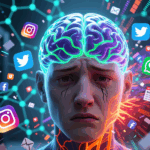Now Reading: Der 3-2-1 Sprachtrick: Wie du sofort klarer denkst und sprichst
-
01
Der 3-2-1 Sprachtrick: Wie du sofort klarer denkst und sprichst
Der 3-2-1 Sprachtrick: Wie du sofort klarer denkst und sprichst

Der 3-2-1 Sprachtrick: Wie du sofort klarer denkst und sprichst
Hast du auch manchmal dieses Gefühl: Jemand stellt dir eine Frage, du weißt die Antwort, aber dein Kopf ist plötzlich leer? Oder du stehst vor einer Gruppe und kannst deine Gedanken nicht präzise in Worte fassen? Das ist völlig normal und hat nichts mit mangelnder Intelligenz zu tun. Es ist oft einfach eine Überforderung deines Gehirns.
Die gute Nachricht: Die Gehirnforschung hat dafür eine elegante und effektive Lösung hervorgebracht – den 3-2-1 Sprachtrick. Dieses simple Framework hilft dir, deine Gedanken sofort zu strukturieren und Blackouts zu vermeiden.
Was steckt hinter dem 3-2-1 Sprachtrick?
Der Kern des Tricks ist ein Framework, das deinem Gehirn eine Landkarte an die Hand gibt. Unser limbisches System bewertet spontanes Sprechen oft als potenziell gefährlich oder stressig, was zu Denkblockaden führen kann. Das Gehirn liebt jedoch Sequenzen und Vorhersagbarkeit.
Die 3-2-1-Struktur erzeugt eine sogenannte Predictive Chain (Vorhersagekette). Sobald du mit der 3-2-1-Struktur beginnst, weiß dein Gehirn, was als Nächstes kommt. Dieser Rahmen reduziert den Stress und aktiviert sogar das Belohnungssystem, weil die Aufgabe vorhersehbar wird. Anstatt im Chaos zu versinken, liefert dein Gehirn automatisch passende Inhalte in die vorgegebene Form.
Das 3-2-1 Framework in der Praxis
Das Framework besteht aus drei wählbaren Optionen, die du je nach Situation anwenden kannst, um sofort eine Struktur zu haben. Du musst nur eine davon wählen.
1. Drei Schritte/Punkte/Wege
Dies ist die gängigste und detaillierteste Struktur. Sie eignet sich hervorragend, wenn du einen Prozess erklären, eine These untermauern oder Lösungsansätze präsentieren möchtest.
- Beispiel-Frage: “Was sind deine besten Tipps für mehr Produktivität?”
- Deine 3-2-1-Antwort: “Es gibt drei entscheidende Schritte für mehr Produktivität. Erstens: Plane deinen Tag am Abend zuvor. Zweitens: Setze klare Prioritäten mit der 80/20-Regel. Drittens: Eliminiere alle digitalen Ablenkungen für definierte Arbeitsblöcke.”
2. Zwei Arten/Perspektiven/Seiten
Diese Option ist ideal, um eine Gegenüberstellung, einen Vergleich oder unterschiedliche Standpunkte darzustellen. Sie schafft schnell Klarheit und Tiefe.
- Beispiel-Frage: “Wie stehst du zum Thema Home-Office?”
- Deine 3-2-1-Antwort: “Ich sehe zwei Hauptperspektiven beim Thema Home-Office. Einerseits gibt es die Gruppe, die die Flexibilität und die höhere Konzentration schätzt. Andererseits gibt es diejenigen, die den sozialen Austausch und die klare Trennung von Arbeit und Privatleben im Büro vermissen.”
3. Eine Sache/Kernaussage/Wahrheit
Wenn du schnell zum Punkt kommen musst oder eine starke, zentrale Botschaft senden willst, ist die Option “Eine Sache” dein Anker.
- Beispiel-Frage: “Was ist die wichtigste Lektion, die du im letzten Jahr gelernt hast?”
- Deine 3-2-1-Antwort: “Die eine Sache, die ich gelernt habe, ist, dass Motivation immer nach der Handlung kommt, nicht davor. Der Schlüssel ist nicht, auf die Motivation zu warten, sondern einfach anzufangen.”
So trainierst du den Trick
Der 3-2-1 Sprachtrick funktioniert wie ein Autopilot, aber er muss trainiert werden. Hier sind ein paar Übungen:
- Zufällige Fragen: Bitte Freunde, dich mit random Fragen zu bombardieren (“Was denkst du über Minimalismus?”, “Wie löst du Konflikte?”). Zwinge dich, nur in einer der 3-2-1-Strukturen zu antworten.
- Spiegel-Training: Stell dich vor den Spiegel und beantworte dir selbst spontane Fragen, indem du jedes Mal eine andere 3-2-1-Option wählst.
- Gesprächs-Anker: Mitten im Gespräch, wenn du merkst, dass du ins Stocken gerätst, wähle sofort eine 3-2-1-Struktur als mentalen Anker, um deine Antwort zu ordnen.
Indem du deinem Gehirn diese einfache Struktur anbietest, kannst du die emotionale Stressreaktion umgehen, Denkblockaden auflösen und sofort klarer, präziser und schneller sprechen. Der 3-2-1 Sprachtrick ist dein Schlüssel zu einer selbstbewussten und strukturierten Kommunikation.
Wenn du erfahren möchtest, wie dieses Framework dir hilft, sofort schneller zu denken und zu sprechen, sieh dir 7 Minuten Gehirnforschung und du sprichst & denkst SOFORT SCHNELLER an.
Dieses Video erklärt im Detail die neurologischen Grundlagen, warum der 3-2-1 Sprachtrick so effizient ist.
























